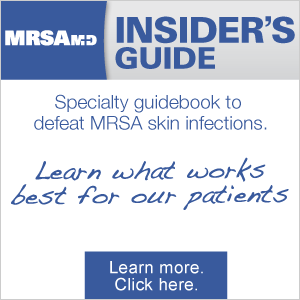Healthcare-Associated MRSA
Overview
Healthcare-associated MRSA (HA-MRSA),previously termedHospital-associated MRSA,is MRSA that is contracted within the healthcare setting. By definition, an individual with HA-MRSA meets one or more of the following criteria:
- Patient in a hospital or nursing home in the past year.
- Resident in another type of healthcare facility in the past year.
- Patient has an indwelling catheter or other indwelling medical device.
Potent Antibiotic Resistance
HA-MRSA carries a potent gene for antibiotic resistance. Therefore:
- HA-MRSA is resistant to most oral antibiotics.
- IV antibiotics are usually required.
Serious MRSA Infections
- Individuals with HA-MRSA often have chronic medical conditions that weaken the body’s ability to fight infection; therefore, serious infections are more common with HA-MRSA.
- Serious infections, also known as invasive infections, are infections that invade or attack the body. Invasive infections affect the entire body, and are potentially life threatening.
- It is estimated that 85% of MRSA related hospitalizations and deaths are secondary to HA-MRSA. For details see “How Serious Is MRSA?”
Diagnosis of HA-MRSA
Information on the diagnosis of invasive infections is found under “Diagnosis / Testing for MRSA.” The links below will take you directly to specific infections.
- MRSA Cellulitis
- MRSA Pneumonia
- MRSA Kidney Infection (Pyelonephritis)
- MRSA Joint Infection
- MRSA Bone Infection (Osteomyelitis)
- MRSA Heart Infection (Endocarditis)
- MRSA Bloodstream Infection
Treatment for HA-MRSA
- Most HA-MRSA infections require hospitalization and IV antibiotics.
- For treatment details see “Treatment for MRSA” / “Serious/Invasive MRSA Infections.”

